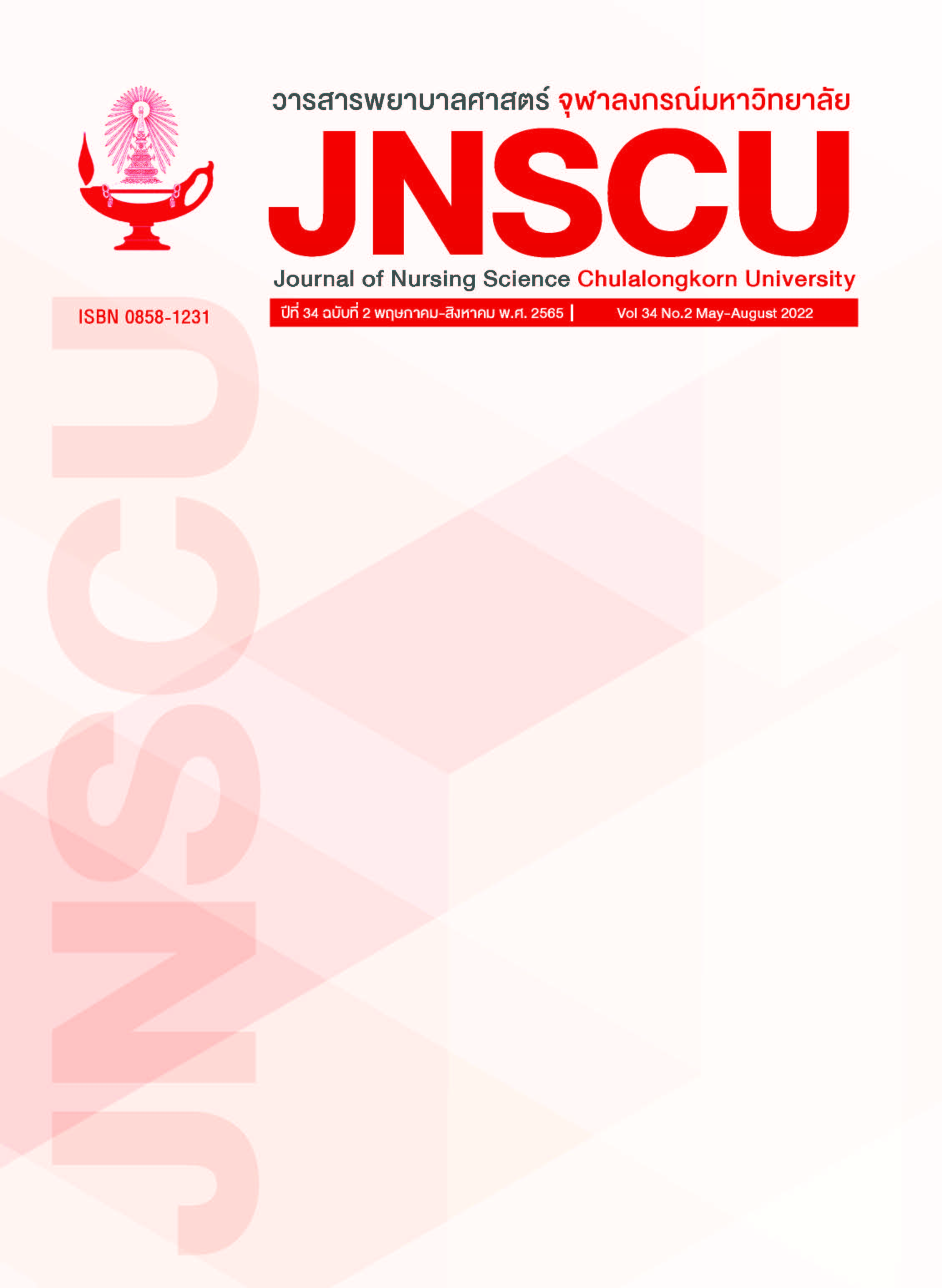ผลของโปรแกรมการดูแลวิถีพุทธต่อคุณภาพชีวิตด้านสุขภาพของผู้ป่วยมะเร็ง ท่อน้ำดีระยะลุกลาม
คำสำคัญ:
การดูแลวิถีพุทธ, คุณภาพชีวิตด้านสุขภาพ, ผู้ป่วยมะเร็งท่อน้ำดีระยะลุกลามบทคัดย่อ
วัตถุประสงค์: เพื่อเปรียบเทียบคุณภาพชีวิตด้านสุขภาพของผู้ป่วยมะเร็งท่อน้ำดีระยะลุกลามก่อนได้รับโปรแกรมการดูแลวิถีพุทธ, ระยะได้รับโปรแกรมฯ ขณะอยู่โรงพยาบาล, ระยะสิ้นสุดโปรแกรมฯ ขณะอยู่ที่บ้าน และระยะติดตามผลหลังสิ้นสุดโปรแกรมฯ ในสัปดาห์ที่ 6
รูปแบบการวิจัย: การวิจัยครั้งนี้เป็นวิจัยแบบ Quasi experimental with single-group time-series design ศึกษาในกลุ่มตัวอย่างเดียว ติดตามวัดผล 4 ครั้ง ในช่วงเวลาที่แตกต่างกัน
วิธีการดำเนินการวิจัย: กลุ่มตัวอย่างเป็นผู้ป่วยมะเร็งท่อน้ำดีระยะลุกลาม ที่นับถือศาสนาพุทธ อายุ 20 ปีขึ้นไป จำนวน 24 คน เครื่องมือวิจัย คือ แบบบันทึกข้อมูลส่วนบุคคล โปรแกรมการดูแลวิถีพุทธ แบบประเมิน Functional Assessment of Chronic Illness Therapy–Palliative Care (FACIT-Pal) ฉบับภาษาไทย และแบบประเมินการยอมรับความตายวิถีพุทธ (Buddhist Death Acceptance Scale) ที่มีค่าสัมประสิทธิ์แอลฟาครอนบาคเท่ากับ .94 และ .73 ตามลำดับ กลุ่มตัวอย่างได้รับการพยาบาลตามปกติ และโปรแกรมการดูแลวิถีพุทธในโรงพยาบาล และนำไปปฏิบัติต่อที่บ้าน วิเคราะห์ข้อมูลด้วยสถิติการวิเคราะห์ความแปรปรวนทางเดียวแบบวัดซ้ำ(One-way repeated ANOVA)
ผลการวิจัย: คะแนนเฉลี่ยคุณภาพชีวิตด้านสุขภาพโดยรวมของผู้ป่วยมะเร็งท่อน้ำดีระยะลุกลาม ระยะได้รับโปรแกรมฯขณะอยู่ในโรงพยาบาล และระยะสิ้นสุดโปรแกรมฯขณะอยู่ที่บ้าน มากกว่าก่อนได้รับโปรแกรมฯอย่างมีนัยสำคัญทางสถิติที่ .05 แต่คะแนนเฉลี่ยคุณภาพชีวิตด้านสุขภาพโดยรวมในระยะติดตามผลในสัปดาห์ที่ 6 กับระยะก่อนได้รับโปรแกรมฯ ไม่แตกต่างกัน ทั้งนี้มิติความผาสุกด้านจิตอารมณ์ในระยะติดตามผลในสัปดาห์ที่ 6 มากกว่าระยะก่อนได้รับโปรแกรมฯอย่างมีนัยสำคัญทางสถิติที่ .05
สรุป: โปรแกรมฯสามารถส่งเสริมคุณภาพชีวิตด้านสุขภาพของผู้ป่วยมะเร็งท่อน้ำดีระยะลุกลาม ทั้งในระยะได้รับโปรแกรมฯขณะอยู่ในโรงพยาบาล และระยะสิ้นสุดโปรแกรมฯขณะอยู่ที่บ้าน และโปรแกรมฯยังส่งผลให้ผู้ป่วยเกิดความผาสุกด้านจิตอารมณ์ในระยะติดตามผลได้
เอกสารอ้างอิง
Banales JM, Marin JJ, Lamarca A, Rodrigues PM, Khan SA, Roberts LR, et al. Cholangiocarcinoma 2020: the next horizon in mechanisms and management. Nat Rev Gastroenterol Hepatol. 2020;17(9):557–88.
Kamsa-ard S, Kamsa-ard S, Luvira V, Suwanrungruang K, Vatanasapt P, Wiangnon S. Risk factors for cholangiocarcinoma in Thailand: a systematic review and meta-analysis. Asian Pac J Cancer Prev APJCP. 2018;19(3):605.
Blechacz B. Cholangiocarcinoma: current knowledge and new developments. Gut Liver. 2017;11(1):13.
Cella DF. Quality of life: concepts and definition. J Pain Symptom Manage. 1994;9(3):186–92.
Mihalache F, Tantau M, Diaconu B, Acalovschi M. Survival and quality of life of cholangiocarcinoma patients: a prospective study over a 4 year period. J Gastrointestin Liver Dis. 2010;19(3).
Woradet S, Songserm N, Promthet S, Parkin DM. Health-related quality of life and survival of cholangiocarcinoma patients in northeastern region of Thailand. PLoS One. 2016;11(9):e0163448.
Zabernigg A, Giesinger JM, Pall G, Gamper EM, Gattringer K, Wintner LM, et al. Quality of life across chemotherapy lines in patients with cancers of the pancreas and biliary tract. BMC Cancer. 2012;12(1):1–8.
Bibeau K, Bachini M, Lindley A, Barkey NM, Lindsey S. Exploring the diagnostic journey and life impact of patients with cholangiocarcinoma (CCA): Results from a large patient survey in the United States. 2021;
Siani E. Fields of Life and Death: Cholangiocarcinoma, Food Consumption, and Masculinity in Buddhist Rural Thailand. 2022;
Somjaivong B, Thanasilp S, Preechawong S, Sloan R. The influence of symptoms, social support, uncertainty, and coping on health-related quality of life among cholangiocarcinoma patients in northeast Thailand. Cancer Nurs. 2011;34(6):434–42.
World Health Organization. Strengthening of palliative care as a component of integrated treatment throughout the life course. J Pain Palliat Care Pharmacother. 2014;28(2):130–4.
Pattarapong Thammarongpreechachai. Wisdom of Happiness through Self-Compassion. J Lib Arts Maejo Univ. 2021;9(2):224–37.
Krapo M, Thanasilp S, Chimluang J. Factors Associated With Death Acceptance Among Thai Patients With Advanced Cancer1. Asian J Public Opin Res. 2018;6(1):18–30.
Ray A, Block SD, Friedlander RJ, Zhang B, Maciejewski PK, Prigerson HG. Peaceful awareness in patients with advanced cancer. J Palliat Med. 2006;9(6):1359–68.
Philipp R, Mehnert A, Lo C, Müller V, Reck M, Vehling S. Characterizing death acceptance among patients with cancer. Psycho‐Oncology. 2019;28(4):854–62.
Lin CP, Evans CJ, Koffman J, Sheu SJ, Hsu SH, Harding R. What influences patients’ decisions regarding palliative care in advance care planning discussions? Perspectives from a qualitative study conducted with advanced cancer patients, families and healthcare professionals. Palliat Med. 2019;33(10):1299–309.
Forner A, Vidili G, Rengo M, Bujanda L, Ponz‐Sarvisé M, Lamarca A. Clinical presentation, diagnosis and staging of cholangiocarcinoma. Liver Int. 2019; 39:98–107.
Cohen J. Statistical power analysis for the behavioural sciences, xxi. Hillsdale NJ Erlbaum Assoc. 1998;
Thanasilp S, Akkayagorn L, Suwannapong K, Long NH, Chimluang J, Upasen R, et al. The Development and Psychometric Testing of the Buddhist Death Acceptance Scale. Pac Rim Int J Nurs Res. 2020;24(4):527–37.
Chinda M, Jaturapatporn D, Kirshen AJ, Udomsubpayakul U. Reliability and validity of a thai version of the edmonton symptom assessment system (ESAS–Thai). BMJ Support Palliat Care. 2012;2(Suppl 1):A8–9.
Soowit B, Panasakulkan S, Muksiritipanun B. The assessment of the suffering symptoms in palliative care patients. Songklanagarind J Nurs. 2015;35(1):153–64.
Phra Sakdithat Samvaro. The Model and Process of Caring for the End-of-Life Patients according to the Buddhist Principles of People in Phrae Province. Dhammathas Acad J. 2019;19(2):175–88.
ดาวน์โหลด
เผยแพร่แล้ว
ฉบับ
ประเภทบทความ
สัญญาอนุญาต
ลิขสิทธิ์ (c) 2023 วารสารพยาบาลศาสตร์ จุฬาลงกรณ์มหาวิทยาลัย

อนุญาตภายใต้เงื่อนไข Creative Commons Attribution-NonCommercial-NoDerivatives 4.0 International License.
##default.contextSettings.thaijo.licenseTerms##


